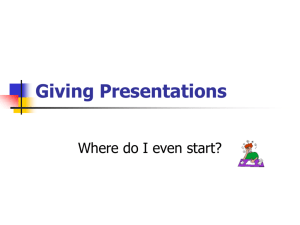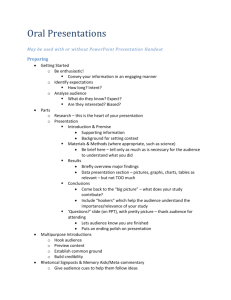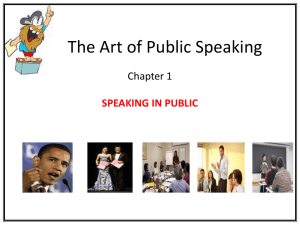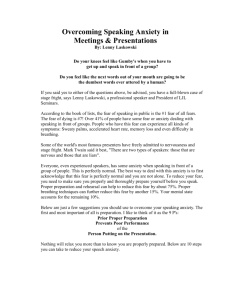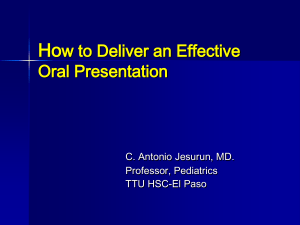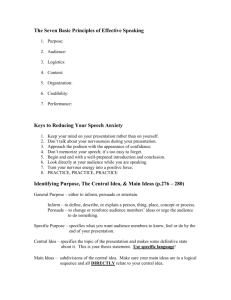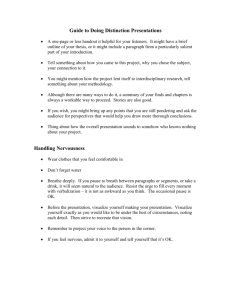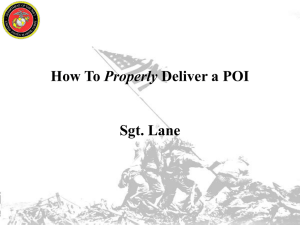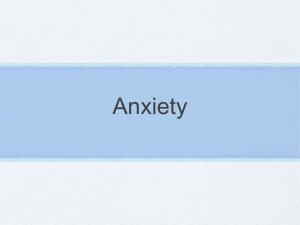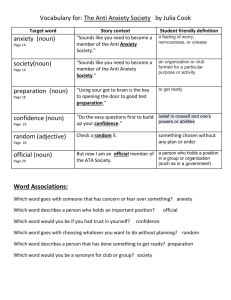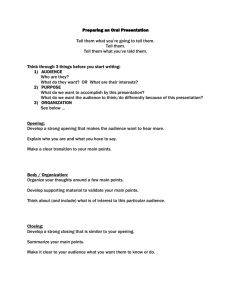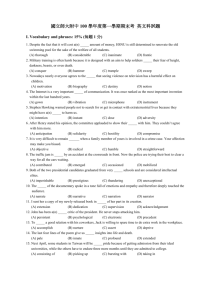Managing Speaking Anxiety
advertisement
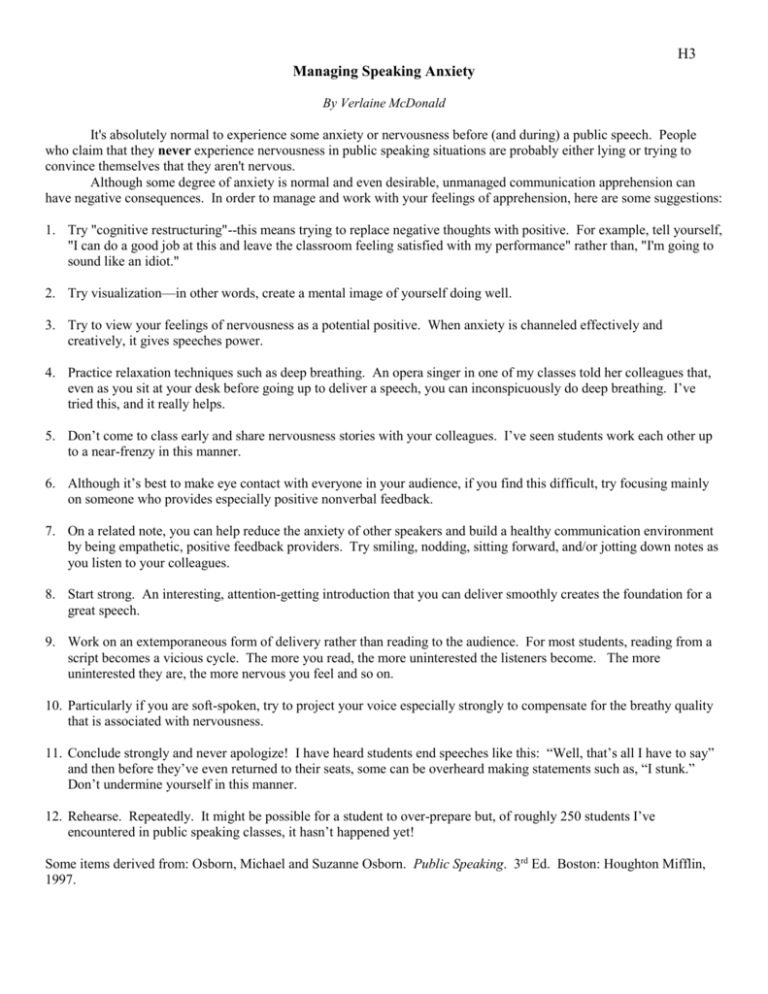
H3 Managing Speaking Anxiety By Verlaine McDonald It's absolutely normal to experience some anxiety or nervousness before (and during) a public speech. People who claim that they never experience nervousness in public speaking situations are probably either lying or trying to convince themselves that they aren't nervous. Although some degree of anxiety is normal and even desirable, unmanaged communication apprehension can have negative consequences. In order to manage and work with your feelings of apprehension, here are some suggestions: 1. Try "cognitive restructuring"--this means trying to replace negative thoughts with positive. For example, tell yourself, "I can do a good job at this and leave the classroom feeling satisfied with my performance" rather than, "I'm going to sound like an idiot." 2. Try visualization—in other words, create a mental image of yourself doing well. 3. Try to view your feelings of nervousness as a potential positive. When anxiety is channeled effectively and creatively, it gives speeches power. 4. Practice relaxation techniques such as deep breathing. An opera singer in one of my classes told her colleagues that, even as you sit at your desk before going up to deliver a speech, you can inconspicuously do deep breathing. I’ve tried this, and it really helps. 5. Don’t come to class early and share nervousness stories with your colleagues. I’ve seen students work each other up to a near-frenzy in this manner. 6. Although it’s best to make eye contact with everyone in your audience, if you find this difficult, try focusing mainly on someone who provides especially positive nonverbal feedback. 7. On a related note, you can help reduce the anxiety of other speakers and build a healthy communication environment by being empathetic, positive feedback providers. Try smiling, nodding, sitting forward, and/or jotting down notes as you listen to your colleagues. 8. Start strong. An interesting, attention-getting introduction that you can deliver smoothly creates the foundation for a great speech. 9. Work on an extemporaneous form of delivery rather than reading to the audience. For most students, reading from a script becomes a vicious cycle. The more you read, the more uninterested the listeners become. The more uninterested they are, the more nervous you feel and so on. 10. Particularly if you are soft-spoken, try to project your voice especially strongly to compensate for the breathy quality that is associated with nervousness. 11. Conclude strongly and never apologize! I have heard students end speeches like this: “Well, that’s all I have to say” and then before they’ve even returned to their seats, some can be overheard making statements such as, “I stunk.” Don’t undermine yourself in this manner. 12. Rehearse. Repeatedly. It might be possible for a student to over-prepare but, of roughly 250 students I’ve encountered in public speaking classes, it hasn’t happened yet! Some items derived from: Osborn, Michael and Suzanne Osborn. Public Speaking. 3rd Ed. Boston: Houghton Mifflin, 1997. Nervousness (Oral Communication) A study by students at Wayne State University showed that 60-75 percent of all speakers are bothered by nervousness with 35 percent considering it a severe problem. It's reassuring to know you are not alone; it is also good to know, even in the worst cases, the audience does not view your fright as seriously as you do. I. Nervousness shows internally and externally. A. Internally: dryness of mouth, rapid heartbeat, sinking feeling in stomach. B. Externally: 1) Fidgeting--shuffling feet, swaying, swinging arms, arms stiff, won't look at audience, pacing. 2) Inhibition--lacks excitement, knees tremble, hands in pocket, face pale, returns to seat while speaking, tense face, hands tremble. 3) Autonomia--moistens lips, plays with something on desk or apparel, blushes, breathes heavily, swallows repeatedly. II. An emotion (in this case, fear) is primarily a result of your awareness of your own bodily reactions. We have to have these reactions for protection so don't let them bother you to the extent they stand in the way of communication. The excitement is body readiness, not panic. III. Don't try to eliminate fear, but control it since these reactions are for a purpose. A. Trembling: the flexor and extensor parts of the muscles are pulling at each other wanting to help you out. B. Sinking feeling: adrenaline in blood is increased to give more sugar for energy; to secrete this emergency energy, the stomach contracts. C. Sick and nauseous: the adrenaline secretion causes a chemical reaction which stops the digestive system. D. Fast heartbeat: the amount of oxygen in the blood is determined by the heartbeat; since additional oxygen is needed the heart beats faster. IV. Utilize the additional tension and make it work for, rather than against, you. A. Bodily activity-planned movements use the energy otherwise available for signs of nervousness (walk briskly to front, take deep breaths, press against the chair or floor). B. Redirect your activity-force yourself to think of something else (another speaker, the room, whatever you're going to say). C. Protect your memory, frightened usually of forgetting. The more you know, the more you can afford to forget. If you forget, quickly go back to the beginning and summarize. Don't memorize. Have only major points (outline) on note cards, so you don't have to worry about losing your place or looking down. D. Preparation-don't be rushed by last-minute work on speech. E. Know you look OK and then forget it. F. Don't let your emotions overrule. Every negative comment you make to yourself will amount to one more degree of tension. Don't talk yourself into falling apart. What's the worst that can happen? G. Be enthusiastic about giving the speech so people will look forward to what you say, not sympathize with you. We usually fulfill the expectations of the audience. H. Concentrate on the message, not on yourself. I. Don't be afraid of mistakes. Don't cover over a mistake; simply correct it and go on. "All we have to fear, Americans, is fear itself." How do you react to Franklin D. Roosevelt's comment? Center for Transformative Learning Peer Consultation Stephenson Hall CPO 2136 x3404
